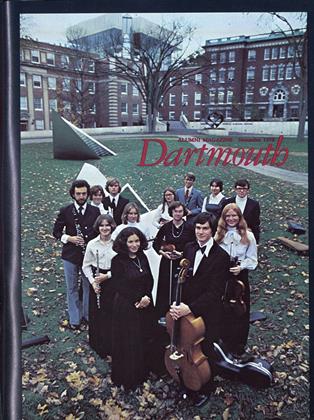In editing this new selection from the work of the turn-of-the-century poet Paul Laurence Dunbar, Dartmouth art professor Ashley Bryan challenges the venerable and persistent habit of literary stereotyping. For whatever reasons — maybe the way we teach literature in the classroom has something to do with it — from Ann Bradstreet to Robert Lowell American poets have attracted the stereotype catchphrase. Emerson is a "transcendental poet," of course; James Whitcomb Riley, the "Hoosier poet." Sandburg, everyone knows, is "the poet of Chicago"; and Frost is a "New England poet." Paul Laurence Dunbar, of course, is the great black "dialect poet."
In his short life Dunbar fought many enemies. He was poor, struggling poor. He never had robust health; tuberculosis killed him at age 33. He was, as Bryan reminds us, the son of parents who had been born into slavery, a post-Civil War black who "grew to maturity during a crucial period in America's history" when "economic and social discrimination against blacks was extreme."
But Dunbar, the poet Dunbar, fought no enemy more insidious than his own public image. It began with almost his first book. William Dean Howells started it with a seminal review in which he praised Dunbar's black dialect poems extravagantly but dismissed the poems written in standard English with a sniff ("very good, ... but not distinctively his contribution to the body of American poetry"). The stereotype took hold, its genesis, as Bryan suggests, in the minstrel-show mentality of the late 19th century which "had conditioned his audience to expect laughter and comfortable sentiments" from a black poet, and to expect them, moreover, in black dialect.
In I Greet the Dawn Bryan selects over 125 of Dunbar's poems written almost entirely in standard English, not dialect. In so doing he demonstrates a point which, but for the persistence of stereotype, should never have had to be demonstrated. Dunbar was not a dialect poet. He was a poet, period. He was a perceptive reader of Keats, Shelley, and Tennyson; he wrote love poems, complex and sophisticated love poems; he wrote nature lyrics; he was master of the Petrarchan sonnet; the musical quality of his verse was of such an order that the English composer Samuel Coleridge-Taylor set a number of Dunbar's poems to music and persuaded the poet to appear with him in a joint recital.
There is little in this collection to suggest a poet merely of "laughter and comfortable sentiments." The laughter is counterpointed by anguish, the hope by despair. There is occasionally a bitter tone; there is wit; and there is Dunbar's wry, third-person awareness of his own stereotype:
He sang of love when earth was young,And Love, itself, was in his lays.But ah, the world, it turned to praiseA jingle in a broken tongue.
His edition of Dunbar puts Bryan in the best tradition of editor-as-iconoclast, freeing the poet — the man, even — from the myth. Dunbar is well served by Bryan the artist through his delightful, though unobtrusive, illustrations, by Bryan the editor through his selection of poems that demands a fresh look at the poet, and through a sympathetic biographical introduction that throws fresh light on the man.
I GREET THE DA WN:Poems by Paul Laurence DunbarEdited and illustratedby Professor Ashley BryanAthenaeum, 1978. 170 pp. $7.95
 View Full Issue
View Full Issue
More From This Issue
-
 Feature
FeatureThe Researcher and the Teacher
November 1978 By Shelby Grantham -
 Feature
FeatureJazz Comes to College
November 1978 By Dick Holbrook -
 Feature
Feature'A hell of a lot of life gone by'
November 1978 By Dan Nelson -
 Feature
FeatureMaking Music
November 1978 By Dana Grossman -
 Article
ArticleThe Joy of Moving
November 1978 By W.B.C. -
 Article
ArticleMan of the Cloth
November 1978 By M.B.R.
R.H.R.
-
 Books
BooksNotes on an expatriate's look homeward and on a bookman in a vast, sparsely inhabited region
October 1976 By R.H.R. -
 Books
BooksAn Attendant Lord
November 1976 By R.H.R. -
 Books
BooksMonticello to Montmartre
November 1976 By R.H.R. -
 Books
BooksNotes on some gentlemen songsters, with an aside on "antique and toothless alumni"
December 1976 By R.H.R. -
 Books
BooksNotes on a realist among the Cassandras and one microcosmic answer to a macrocosmic question
NOV. 1977 By R.H.R. -
 Books
BooksObserving Life
JAN./FEB. 1978 By R.H.R.
Books
-
 Books
BooksCANCER: DISEASE OF CIVILIZATION?
March 1961 By DR. HENRY R. VIETS '12 -
 Books
BooksElusive or Realizable?
JAN.- FEB. 1982 By Elise Boulding -
 Books
BooksThe Liberty of Citizenship
March 1916 By F.A.U. -
 Books
BooksEXPECTANT PEOPLES.
OCTOBER 1964 By FRANK R. SAFFORD -
 Books
BooksVASSI AND FIDELES IN THE CAROLING
August 1945 By John R. Williams '19 -
 Books
BooksThe Master of Taliesin
MARCH 1982 By William Morgan '66


